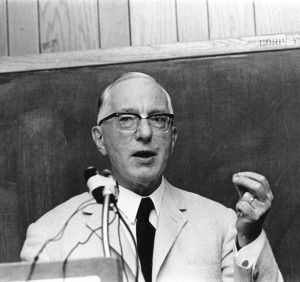Voegelin

Perhaps my favorite Voegelin quote: "No one is obliged to take part in the spiritual crisis of a society; on the contrary, everyone is obliged to avoid this folly and live his life in order." Science, Politics, and Gnosticism.
This, of course, is easier said than done. Unless your TV only gets EWTN, it's nearly impossible to avoid the spiritual crisis since, as Max Picard pointed out fifty years ago, modern society is mass society: its spiritual disorder is pushed upon everyone everywhere through the popular media and everyday living.
Does one become a hermit, like Plato suggested (in his analogy that a man in a corrupt society must live like a man taking shelter in a cave during a snow storm)? I don't think so, though it's a respectable position. I'm more inclined to think that every person needs to carve out as much quiet time as possible, whether the quiet time is called "prayer," "contemplation," "mental training," "communing with nature," "sitting on the dock of the bay like Otis Redding," or "healthy boozing." To each lies a different path. Just try not to swim with the diseased tide . . . even dead things, GKC liked to point out, can do that.
Postscript: I used to spend one week vacationing in a run-down cottage that sat about two blocks from Michigan's largest inland lake. The cottage sat among other crappy little houses, a redneck-type paradise, I suppose. I spent a lot of time in the little cottage, just reading and thinking and being bored. . . and watching the guy who lived next door. Every day at about 10:00 AM, he would walk out to his picnic table with a case of cheap beer (Milwaukee's Best, I think). He'd sit on the picnic table, drinking his beer and smoking cigarettes, staring out at the traffic on M-55 (which ran about 50 yards from his house; an unpaved parking lot divided his hard-scrabble yard from the highway). With the exception of a stray visitor that would pop by to see him (whom he would receive warmly), that's all he did. Ten years later, I remember the guy clearly. His was hardly a productive life, I know, but there was something there. And I sometimes wonder if Voegelin's quote above has something to do with it. Voegelin taught it was an act of courage for a man to live a life attuned to the "transcendent" (one of V's favorite words). The man on the picnic table's daily life was hardly transcendentally-tuned, but the beer perhaps served a similar purpose, allowing him a sense of ersatz transcendence. He certainly looked peaceful enough.
